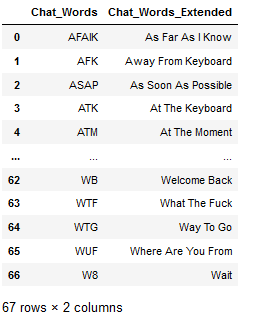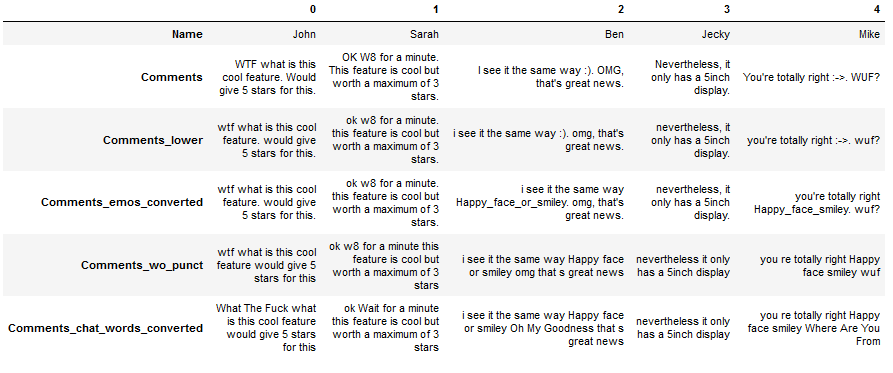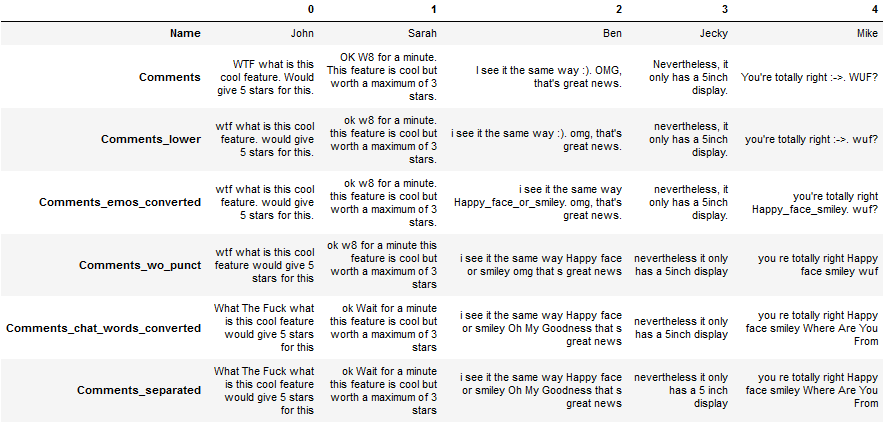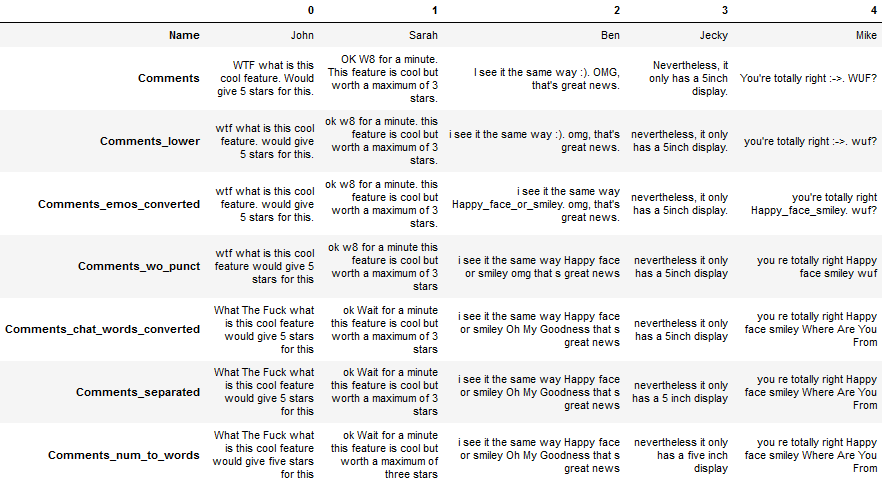1 Introduction
I have already described the most common and most used Text Cleaning Steps in this post here: Text Pre-Processing I (Text Cleaning)
However, it may happen that the analysis request requires other processing of the text, for example, if numbers are not to be removed but converted into text and analyzed as well.
This post is about such special cases.
Feel free to download the files I used from my GitHub Repository.
2 Import the Libraries
import pandas as pd
from num2words import num2words
import re3 Definition of required Functions
All functions are summarized here. I will show them again where they are used during this post if they are new and have not been explained yet.
def remove_punctuation_func(text):
'''
Removes all punctuation from a string, if present
Args:
text (str): String to which the function is to be applied, string
Returns:
Clean string without punctuations
'''
return re.sub(r'[^a-zA-Z0-9]', ' ', text)from emo_dictonary import EMOTICONS
def emoticons_to_words_func(text):
'''
Convert Emoticons to Words
Args:
text (str): String to which the function is to be applied, string
Returns:
Clean string with converted Emoticons to Words
'''
for emot in EMOTICONS:
emoticon_pattern = r'('+emot+')'
# replace
emoticon_words = EMOTICONS[emot]
replace_text = emoticon_words.replace(",","")
replace_text = replace_text.replace(":","")
replace_text_list = replace_text.split()
emoticon_name = '_'.join(replace_text_list)
text = re.sub(emoticon_pattern, emoticon_name, text)
return textdef chat_words_to_norm_words_func(text):
'''
Replaces common chat expressions with their spelled out form
Args:
text (str): String to which the function is to be applied, string
Returns:
Clean string with replaced chat expressions
'''
return re.sub(r'\S+', lambda m: chat_expressions_dict.get(m.group().upper(), m.group()) , text)def sep_num_words_func(text):
'''
Separates numbers from words or other characters
Args:
text (str): String to which the function is to be applied, string
Returns:
Clean string with separated numbers from words or other characters
'''
return re.sub(r"([0-9]+(\.[0-9]+)?)",r" \1 ", text).strip() def num_to_words(text):
'''
Convert Numbers to Words
Args:
text (str): String to which the function is to be applied, string
Returns:
Clean string with converted Numbers to Words
'''
after_spliting = text.split()
for index in range(len(after_spliting)):
if after_spliting[index].isdigit():
after_spliting[index] = num2words(after_spliting[index])
numbers_to_words = ' '.join(after_spliting)
return numbers_to_words4 Text Pre-Processing - Special Cases
As you may recall, in my first Text Pre-Processing post, I created a guideline for Text Cleaning. The following three sections are about special cases that can be applied in text cleaning (for example, because the analysis requirements demand it).
However, it is of essential importance at which point the operations are performed!
Of course I have listed this in each section and summarized it in the last chapter ‘Application to a DataFrame’.
4.1 Converting Emoticons to Words
This operation should be performed in any case before Removing Punctuation. I will explain why in chapter 5 Application to a DataFrame.
I found the dictionary of emoticons and emojis (emo_dictonary.py) as well as the following function in this GitHub Repository.
from emo_dictonary import EMOTICONS
def emoticons_to_words_func(text):
'''
Convert Emoticons to Words
Args:
text (str): String to which the function is to be applied, string
Returns:
Clean string with converted Emoticons to Words
'''
for emot in EMOTICONS:
emoticon_pattern = r'('+emot+')'
# replace
emoticon_words = EMOTICONS[emot]
replace_text = emoticon_words.replace(",","")
replace_text = replace_text.replace(":","")
replace_text_list = replace_text.split()
emoticon_name = '_'.join(replace_text_list)
text = re.sub(emoticon_pattern, emoticon_name, text)
return textmessy_text_conv_emo = \
"You really did a great job :)!\
"
messy_text_conv_emo
emoticons_to_words_func(messy_text_conv_emo)
As we can see, the function does not interfere with punctuation marks, even if they directly follow emoticons.
messy_text_conv_emo2 = \
"You really did a great job :( !\
"
messy_text_conv_emo2
emoticons_to_words_func(messy_text_conv_emo2)
messy_text_conv_emo3 = \
"Great! 8‑D\
"
messy_text_conv_emo3
emoticons_to_words_func(messy_text_conv_emo3)
4.2 Converting Chat Conversion Words to normal Words
This operation should be performed before we remove irrelevant characters (Numbers and Punctuation) from a text.
First we need to load the following data set.
This can be done in two ways. Either you download the file from my GitHub Repository and load it in the usual way in the Jupyter Notebook.
chat_expressions = pd.read_csv('chat_expressions.csv', sep=',')
chat_expressions
Or you can download it directly from my GitHub Repository:
# use raw view for this
url = "https://raw.githubusercontent.com/MFuchs1989/Datasets-and-Miscellaneous/main/datasets/NLP/Text%20Pre-Processing%20VII%20(Special%20Cases)/chat_expressions.csv"
chat_expressions = pd.read_csv(url, error_bad_lines=False)
chat_expressions
Now we create a dictionary from it:
chat_expressions_dict = dict(zip(chat_expressions.Chat_Words, chat_expressions.Chat_Words_Extended))Here is the function we are about to use:
def chat_words_to_norm_words_func(text):
'''
Replaces common chat expressions with their spelled out form
Args:
text (str): String to which the function is to be applied, string
Returns:
Clean string with replaced chat expressions
'''
return re.sub(r'\S+', lambda m: chat_expressions_dict.get(m.group().upper(), m.group()) , text)messy_text_chat_words = \
"I'm afk for a moment\
"
messy_text_chat_words 
chat_words_to_norm_words_func(messy_text_chat_words)
This has worked well before. But be careful, punctuation interferes with the function, see here:
messy_text_chat_words2 = \
"OMG, that's great news.\
"
messy_text_chat_words2
chat_words_to_norm_words_func(messy_text_chat_words2)
It is therefore recommended to remove punctuation marks at this point. We have already learned about this function in the post about text cleaning.
# Remove Punctuation from text
messy_text_chat_words2_wo_punct = remove_punctuation_func(messy_text_chat_words2)
# Convert chat words to normal words
chat_words_to_norm_words_func(messy_text_chat_words2_wo_punct)
4.3 Converting Numbers to Words
The following function can be used after the emoticons and chat words have been converted (since they may contain numbers and thus lose their meaning) but before irrelevant characters (Numbers and Punctuation) have been removed from the text.
def num_to_words(text):
'''
Convert Numbers to Words
Args:
text (str): String to which the function is to be applied, string
Returns:
Clean string with converted Numbers to Words
'''
after_spliting = text.split()
for index in range(len(after_spliting)):
if after_spliting[index].isdigit():
after_spliting[index] = num2words(after_spliting[index])
numbers_to_words = ' '.join(after_spliting)
return numbers_to_words4.3.1 Small Numbers
messy_text_numbers_to_words = \
"I paid 6 dollars for it.\
"
messy_text_numbers_to_words
num_to_words(messy_text_numbers_to_words)
4.3.2 Larger Numbers
messy_text_numbers_to_words2 = \
"I give 42 points which results in a 4 star rating. \
"
messy_text_numbers_to_words2
num_to_words(messy_text_numbers_to_words2)
4.3.3 Numbers combined with Words and Punctuation
Often we have the case that numbers appear combined with other words or special characters in the text.
messy_text_numbers_to_words3 = \
"Over 50% of today's smartphones have a 6inch screen.\
"
messy_text_numbers_to_words3
Our function will not work on this:
num_to_words(messy_text_numbers_to_words3)
Ok the problem with the special character we can solve with the remove_punctuation function.
messy_text_numbers_to_words3_wo_punct = remove_punctuation_func(messy_text_numbers_to_words3)
messy_text_numbers_to_words3_wo_punct
But now we still have the problem that the 6inch are written together. To solve such problems I have written the following function:
def sep_num_words_func(text):
'''
Separates numbers from words or other characters
Args:
text (str): String to which the function is to be applied, string
Returns:
Clean string with separated numbers from words or other characters
'''
return re.sub(r"([0-9]+(\.[0-9]+)?)",r" \1 ", text).strip()messy_text_numbers_to_words3_separated = sep_num_words_func(messy_text_numbers_to_words3_wo_punct)
messy_text_numbers_to_words3_separated
Now I can use the num_to_words function:
num_to_words(messy_text_numbers_to_words3_separated)
4.3.4 Limitations
Of course the function I wrote is not omnipotent and also has its limitations e.g. this one with floats:
messy_text_numbers_to_words4 = \
"I paid 4.50 for this.\
"
messy_text_numbers_to_words4
num_to_words(messy_text_numbers_to_words4)
messy_text_numbers_to_words4_wo_punct = remove_punctuation_func(messy_text_numbers_to_words4)
messy_text_numbers_to_words4_wo_punct
num_to_words(messy_text_numbers_to_words4_wo_punct)
5 Application to a DataFrame
Note the order in which I will perform the operations. If I would bypass this, for example emoticons could no longer be recognized, because they no longer exist due to the removal of special characters. However, in order to extract the maximum information content from a text, one must consider exactly in which order the functions should be applied.
- Step 1: Converting emoticons into words
- Intermediate Step: Removal of punctuation marks
- Step 2: Converting chat words into real words
- Step 3: Converting numbers into words
The function for emoticons is not affected by punctuation marks. The conversion of chat words (for example if they are placed just before a punctuation mark without a space) is. The function would not work then. In some chat words there are also numbers. Converting them beforehand with our function would therefore make some chat words unusable. Therefore always follow the order as I described it above.
5.1 Loading the Data Set
This dataset is an artificially created dataset by me, which fits well to the just described topics from this post.
pd.set_option('display.max_colwidth', 1000)
df = pd.read_csv('df_text_pre_processing_special_cases.csv')
df.T
For text pre-processing, I’ll stick to the guideline I created in this post: NLP - Text Pre-Processing I (Text Cleaning)
df['Comments_lower'] = df['Comments'].str.lower()
df.T
At this point, we skip the following points as they are not relevant to the problem at hand:
- Removing HTML tags
- Removing URLs
- Removing Accented Characters
5.2 Step 1: Converting emoticons into words
However, before we get to removing special characters or numbers (or converting them to words) we should still convert emoticons to words.
df['Comments_emos_converted'] = df['Comments_lower'].apply(emoticons_to_words_func)
df.T
As we can see on line 2 and 4 (here visually represented as a column) this worked. The emoticons were converted even if punctuation marks were directly before or after them.
5.3 Intermediate Step: Removal of punctuation marks
So that all chat words can now be recognized correctly, we remove all punctuation marks at this point.
df['Comments_wo_punct'] = df['Comments_emos_converted'].apply(remove_punctuation_func)
df.T
5.4 Step 2: Converting chat words into real words
df['Comments_chat_words_converted'] = df['Comments_wo_punct'].apply(chat_words_to_norm_words_func)
df.T
5.5 Step 3: Converting numbers into words
5.5.1 Separation of numbers and words
So that now also all numbers can be converted into words, I separate all numbers from words, if these are written together.
df['Comments_separated'] = df['Comments_chat_words_converted'].apply(sep_num_words_func)
df.T
5.5.2 Numbers2Words
df['Comments_num_to_words'] = df['Comments_separated'].apply(num_to_words)
df.T
Wonderful, the maximum of information has now been extracted.
Now the function to remove unnecessary spaces could be used.
6 Conclusion¶
In this post I showed how to translate emoticons and chat words into real language as well as how to convert numbers into words.
Concluding my post series on text pre-processing, in the next post I would like to give a summary of all the pre-processing steps that fit and can be applied to the dataset.